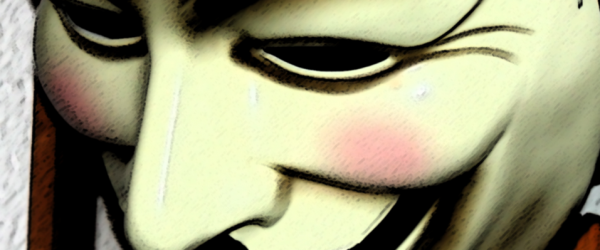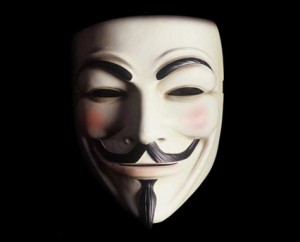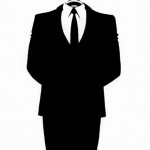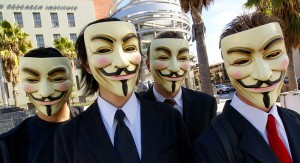
Cynical Guerrilla: The Rise of Anonymous
Commentary, Culture, Digital“We are Anonymous. We are legion. We do not forgive. We do not forget. Expect us.”
–Anonymous, “Message to Scientology”

It happened the other day when I was at lunch. I was walking near my office when I noticed a strange group walking north along the road. They wore all black, and had Guy Fawkes masks on their faces. An escort of bike cops shadowed them. They were orderly, quiet, contained. I’ve seen my share of protests, and this one was different.
It was Anonymous.
Anonymous is an enigmatic group that isn’t a group, a symptom of our times and a manifestation of the convergence of social technology with grassroots disenfranchisement. But is it good or evil?
Who is Anonymous?
How many comments or posts have you seen on websites where the author doesn’t give his name? The author of these posts is shown as “Anonymous”. In 4chan, a well-known breeding ground for internet memes, an in-joke began to develop: Anonymous was an actual person, with a personality, and with actions and thoughts attributed to him. This was the beginning of the Anonymous meme.

In the poltical and “organizational” sense, Anonymous is a term used to describe a group of individuals who self-identify with a shared (yet nebulous) set of ideals. Since membership in Anonymous is a strictly personal and private decision based on shared values, its “membership” numbers and demographics are dynamic and unclear. Having no official membership, leader, structure, or central documents, Anonymous’ purpose and philosophy can only be determined by observing recurring trends and themes in its history, membership and activities. Some of these apparent themes and beliefs are:
- Anonymous believes in free speech and the free sharing of information and ideas
- Anonymous abhors plagiarism (its loathing of eBaums world– which is often accused of stealing content– is an example of this)
- Anonymous has a strong affinity with internet culture and memes
- Anonymous is politically engaged
- Anonymous belives in taking matters into its own hands where it feels that it can
- Anonymous protests actions and organizations it considers unjust
- Despite the assertions of some of its victims, Anonymous does not regard itself as a terrorist organization or one that promotes violence
Anonymous, the Political Actor

My only interaction with Scientology (at the time of writing) happened when I was previewing my last column, Free Stuff, Save Me, and noticed that one of the banner ads displayed on the page said “Brought to you by Scientology”. I thought this was a bit misleading, so I changed our settings and blocked the ad.

Stop it, Tom.
Anonymous has made it its mission to destroy the Church of Scientology, which it accuses of committing gross human rights violations and fraud (Anonymous alleges that the Church of Scientology is actually no more than a business cynically bankrupting its followers for its own enrichment). Anonymous’ anti-Scientology campaign, Project Chanology, has consisted of two main prongs; the viral dissemination of anti-Scientology information and propaganda on the internet, and increasingly, “real world” protests outside of Scientology centers.

These actions have elicited a strong counterattack from Scientology, in the form of counter-information, litigation and appeals to civil and criminal law to curtail Anonymous’ activities, expose the identity of its members, and protect the church from its actions.
The video below, “Message to Scientology”, was Anonymous’ shot across the church’s bow:
The effect of Anonymous’ Project Chanology has been not only to bring mainstream attention to the alleged abuses of the Church of Scientology but also to shine a light on the existence of this new, nebulous, dark, and potent hive mind.
Recently, individuals identifying themselves as Anonymous have acted in support of Wikileaks and its founder Julian Assange. Their actions have most notably included attacks on financial institutions that cut off interactions with Wikileaks. Using DDoS attacks, black faxes, and prank phone calls, Anonymous has harassed and maligned its perceived foes.
Why Is Anonymous Rising?
In the dark story of our generation’s purpose and destiny, is Anonymous Dr. Jekyll or Mr. Hyde?
One of the most frustrating conditions for a human is a feeling of a complete lack of control over his life. In terms of entry into “traditional” politics, the average person is more impotent now than he has been since the signing of the Magna Carta. Modern democracy has deteriorated to the point that instead of worrying only about the next election, leaders now obsess over the next tweet. If traditional parties, institutions and leaders lack the courage to do anything that may be unpopular, or embark on a journey that will last longer than four years, where does that leave the populations they represent?
Want to know the real reason that you constantly hear about “road rage”, “air rage”, “shopping rage”, “walking rage”? Everyone feels terrified and powerless; terrified that they don’t know what they should be doing with their lives, and powerless to change their world in a meaningful way. Boiling over with anger and fear, they will seize upon any opportunity to relieve the pressure through minor dominance displays– you might not be able to do anything about the Gulf oil spill, but you can sure as hell berate that store clerk for his slow service.
Some people turn to the numbing, stupefying preponderance of reality TV to avoid feeling the pain and ennui that our lack of direction creates. Some turn to a culture of gratuitous consumption. But this kind of distraction can only last so long, and doesn’t appeal to everyone.
Others turn to Anonymous. To them it is the perfect cure for the malaise of the castrated soul. A group that they join by will of thought only, one that allows them to feel a part of something greater than themselves, something with a purpose. A group that allows them to participate in the political process without being pressed into a blue-suit-and-red-tie mold. A group that embraces openness, freedom, (and possesses a good dose of self-righteousness).
Philosophrenic’s strip said it best: “It’s no sign of health to be well-adjusted to a sick society.” Our culture is sick, covered in bubonic Snookis and iPhones. Anonymous is not the cure, but it is certainly a fever– the body politic’s response to the presence of social pathogens.






















